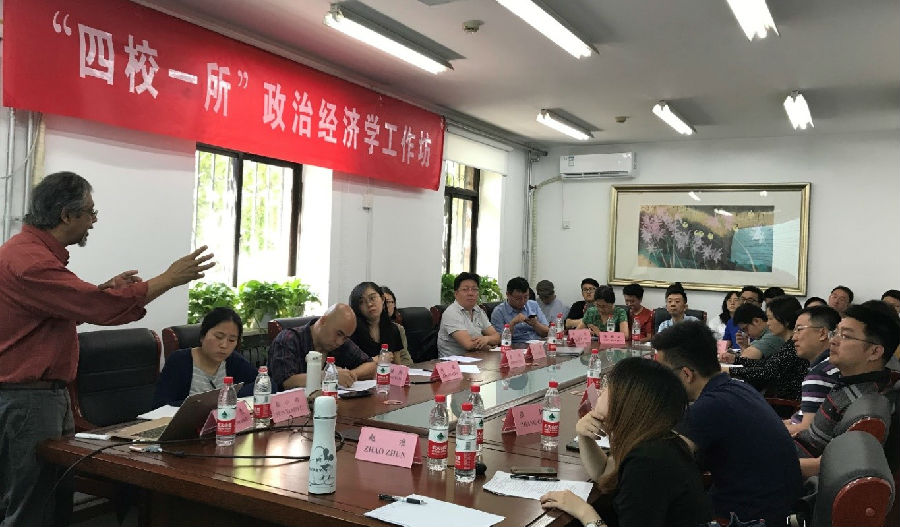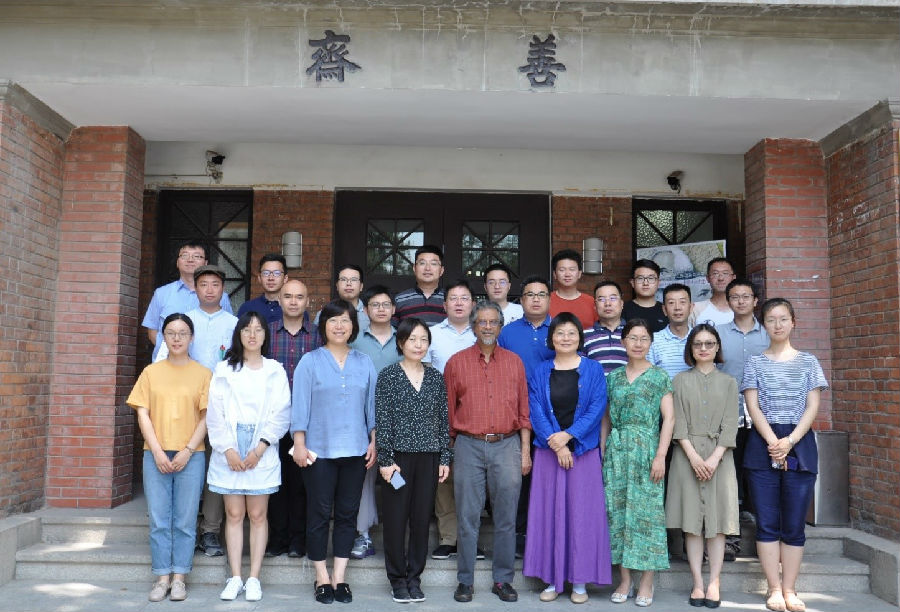On the morning of June 22, 2019, the 3rd Symposium of the “Workshop on Political Economy of Four Universities and One Institute” jointly organized by the Institute of Economics, School of Social Sciences and the School of Marxism of Tsinghua University was held in Conference Room 107, Shanzhai Building, Tsinghua University. At the beginning, Professor Anwar Shaikh, a renowned American political economist, delivered a speech. Then experts and scholars from universities in Beijing commented, asked questions and exchanged opinions and discussed with Professor Anwar Shaikh. Experts and scholars present include Professor Zhang Hui, Vice Dean of the School of Economics, and Professor Fang Min from Peking University; Professor Xie Fusheng, Vice Dean of the School of Economics, Associate Professor Li Qiong and Lecturer Qi Hao from Renmin University of China; Chen Xiangyun, Associate Editor-in-Chief of Teaching and Research, Renmin University of China; Associate Professor Liu Zhen, Associate Professor Cai Wanhuan, Associate Professor Zhang Wei and Assistant Professor Long Zhiming from the School of Marxism, Tsinghua University; Associate Professor Zhao Zhun and Associate Professor Tang Xiaoyang from the School of Social Sciences, Tsinghua University; Lecturer Zhao Min, School of Economics, Nankai University; Assistant Professor Zhang Chi, Institute of Economics, the Chinese Academy of Social Sciences; Professor Jia Lijun, Vice Dean of the School of Humanities and Social Science and Professor Song Xianping from Beijing Institute of Technology; Lecturer Wang Jinqiu, School of Economics, Beijing Technology and Business University, etc.

The theme of Professor Anwar Shaikh’s speech was “A new economics paradigm and framework-which viewpoints come from Marx? What is its difference with the mainstream economics?” The core content of the speech was based on his recent political economics masterpiece Capitalism: Competition, Conflict and Crisis published in 2016, which aimed to establish an economics paradigm different from the mainstream neo-classic economics.
First of all, he pointed out two remarkable characteristics of the world today. First, with the acceleration of globalization, capital and labor flows have increased significantly, and inequality and poverty are also on the rise. However, Shaikh mentioned in particular that China's economic development and the Chinese government's efforts in poverty reduction have made an important contribution to a more equal world. Second, the information era where we are is full of errors, false information and lies. Then, he shared his views on neo-classical theory and traditional Marxist economics. He pointed out that the assumption that individual decision-making in neoclassical theory only considers the maximization of its own utility and the market is in perfect competition is seriously detached from reality. Therefore, it is all wrong to conclude that the market clearing and full employment will be realized automatically so the government does not need to intervene in the market. One of the major defects of the theory is that it neglects the interaction between individual behaviors and the relevant social relations and completely ignores the influences of family, community and nation on individual decision-making and its effectiveness, as well as the emerging characteristics of the entirety that any individual does not possess. However, these wrong theories and conclusions greatly affect the policies of the governments and international organizations. In addition, Shaikh opposed the division of the monopoly capitalism stage by traditional Marxists, especially the monopoly capitalist school. He believed that since the establishment of the capitalist economic system, competition has always been the fundamental force driving the evolution of the capital movement. Large-scale capital accumulation is the result of more intense competition in capital, rather than a lack of competition or imperfect competition. Therefore, it is unreasonable for the monopoly capital school to regard large-scale capital as a symbol of monopoly competition. Its emphasis on monopoly competition or imperfect competition is still not divorced from the set pattern of neoclassical economics, which takes perfect competition as the reference.
Later, He summed up several major characteristics of Marxist economics theory. First, compared with neoclassical theory, Marx believed that individuals were deeply embedded in the complex and three-dimensional social background, such as class, gender, caste, nationality and culture, rather than merely rational persons with “self-interest”. Second, capitalism, as a social and economic system that came into being in the historical context, has its unique development mode and logic. Third, Marx emphasized the strong typical pattern produced by market forces and called it the law of motion.
Based on the classical economics theory and Marxist economics theory, Professor Anwar Shaikh creatively put forward the concept of “real competition” and related theories in his book Capitalism: Competition, Conflict and Crisis. The theory of real competition claims that competition is the most fundamental force to regulate capital, and all corporate behaviors are centered on the goal of profit maximization. Fierce competition and the pursuit of profits push enterprises to continuously cut costs, so as to reduce prices and expand market share. On one hand, enterprises reduce costs by cutting wages or increasing labor hours and intensity, which indicate that the labor-capital struggle is inherent in the pursuit of profits by enterprises. On the other hand, enterprises reduce costs through technological progress. Meanwhile, profits also drive the continuous expansion of enterprises, making growth an intrinsic and essential feature of the capitalist system. Investment behavior creates both supply and demand, which are not necessarily balanced. It indicates that economic development is determined not on the supply side, nor on the demand side, but on the profit side. The result is that capitalism realizes order in and through disorder, and finally presents a turbulent equilibrium process. The corporate goal of profit maximization will always conflict with the optimal public goal of the whole society. Then, the government could intervene through the introduction of relevant laws and regulations. However, government intervention is not the silver bullet and will eventually be restricted by the pursuit of profits by enterprises. Professor Anwar Shaikh also briefly introduced the theoretical discussion and strong empirical verification of Capitalism: Competition, Conflict and Crisis on issues such as relative price, equalization of profit rate of new investment, interest rate and stock market return, and limitations of government policies in stimulating effective demand.
At the end of his speech, Professor Anwar Shaikh hoped that contemporary Marxist economists would take Marxist thought more seriously. He believes that contemporary scholars shall regard Marx as a scientist, study the internal logic of his thought and learn its power, rather than merely quoting his works in a fragmented way, without considering the development clues of his thought and internal logic.
After the speech, Professor Xie Fusheng held a heated discussion with Professor Anwar Shaikh on how Marx criticized “Smith's decomposition” and regarded his neglect of constant capital as “Smith's faith” and that the logical starting point of Marxist economic theory shall be the production or labor process rather than competition. Professor Fang Min discussed with Professor Anwar Shaikh on “the relationship between wages and the price of wage goods” and Associate Professor Tang Xiaoyang on why labor rather than enterprise scale or monopoly power is the decisive factor of relative price. The symposium was successfully concluded in a heated, pleasant and unexhausted ideological confrontation.
The “Workshop on Political Economy of Four Universities and One Institute” was jointly organized by the School of Economics of Peking University, Renmin University of China, Tsinghua University, Nankai University and the Institute of Economics of the Chinese Academy of Social Sciences. The first and second discussions were hosted by the School of Economics of Peking University and the School of Economics of Renmin University of China respectively. (Authors: Dai Linshan and Sun Xiaoyu; Photographer: Li Long)
